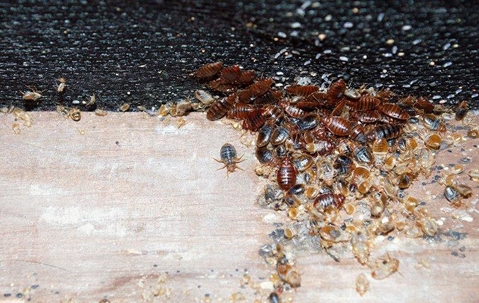Effective Insect Control Procedures to Secure Your Yard and Plants
In the realm of horticulture, the consistency of a well-tended garden can often be interrupted by undesirable bugs that threaten the wellness and vitality of plants. Applying efficient insect control determines not only safeguards the garden's visual charm but also plays a crucial duty in maintaining the plants' health.
Natural Bug Repellents

Another effective natural insect repellent is diatomaceous earth, a fine-grained compound made from fossilized water microorganisms. Diatomaceous earth jobs by literally damaging bugs with its abrasive appearance, making it a superb option for controlling parasites like slugs, beetles, and caterpillars. Furthermore, planting friend plants like marigolds, lavender, or basil can help ward off parasites due to their solid fragrances or all-natural chemical compounds.
Beneficial Pest for Pest Control

One more useful pest is the parasitical wasp, which lays its eggs inside insect insects, ultimately killing them. Ground beetles are excellent for regulating caterpillars, snails, and slugs. Hoverflies, commonly mistaken for bees as a result of their comparable look, prey on aphids, thrips, and caterpillars.
To bring in valuable pests to your yard, you can plant a diverse series of blooming plants, such as dill, fennel, and yarrow, which give nectar and plant pollen for adult insects. Furthermore, avoid making use of broad-spectrum chemicals that can harm both hazardous and valuable bugs. By creating a welcoming atmosphere for these useful insects, you can reduce the demand for chemical pesticides and promote a much healthier, much more balanced yard community.
Companion Planting Techniques
When intending to boost the efficiency of helpful insects in your garden for natural pest control, thinking about friend planting techniques can further enhance the ecosystem balance. Companion growing includes purposefully placing particular plants alongside each other to optimize their mutual benefits, such as deterring pests, drawing in advantageous bugs, or improving nutrition uptake - bed bug exterminator houston near me. One popular example is growing marigolds together with tomatoes to drive away nematodes and various other hazardous bugs while likewise drawing in pollinators
Additionally, including aromatic herbs like basil, mint, or rosemary in between veggie rows can aid deter parasites with their strong aromas. One more efficient technique is growing blossoms such as sunflowers, zinnias, or cosmos to bring in pollinators like and butterflies, which subsequently can help in pollinating your vegetables and fruit crops. Additionally, growing catch crops like nasturtiums can draw away insects far from your main plants, serving as sacrificial plants that secure your beneficial fruit and vegetables. By carrying out companion growing methods, you can produce a diverse and unified garden environment that naturally manages parasites while advertising plant wellness and efficiency.
DIY Parasite Control Solutions
To effectively take care of bugs in your yard, implementing do-it-yourself bug control solutions can be an affordable and environmentally friendly technique - bed bug exterminator houston near me. Establishing up physical barriers like row covers or netting can additionally avoid insects like caterpillars from harming your plants.
Friend growing certain natural herbs and flowers like marigolds, basil, and lavender can assist ward off insects and bring in valuable insects. By including these DIY insect control remedies right into your horticulture routine, you can safeguard your yard and plants without relying on rough chemicals.
Environmentally-Friendly Pesticides

An additional efficient choice is diatomaceous planet, an all-natural material made from fossilized water microorganisms, which can be sprinkled around plants to manage slugs, snails, and various other creeping bugs. Additionally, insecticidal soaps and oils stemmed from plant-based resources are beneficial for controlling soft-bodied pests like aphids, mites, and whiteflies.
Conclusion
To conclude, reliable insect control measures such as all-natural repellents, useful insects, buddy planting methods, DIY remedies, and environmentally-friendly pesticides are crucial for securing your garden and plants. By carrying out these methods, you can protect against damage triggered by parasites and preserve a healthy and balanced and flourishing yard community. It is necessary to think about the lasting effect of making use of pesticides and choose for even more sustainable and eco-friendly options to make certain the health and wellness of your plants and the setting.